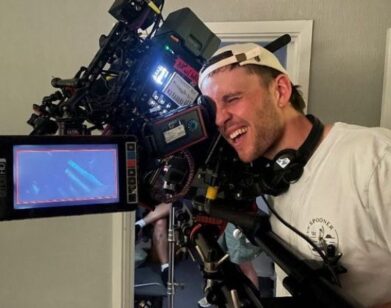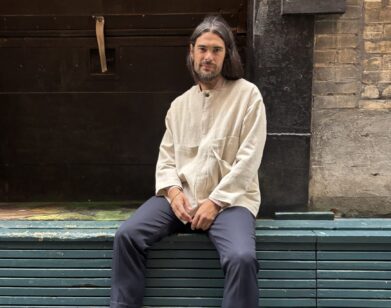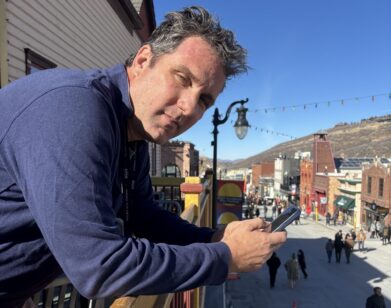IN CONVERSATION
How David Dastmalchian and Trent Reznor Tamed Their Demons
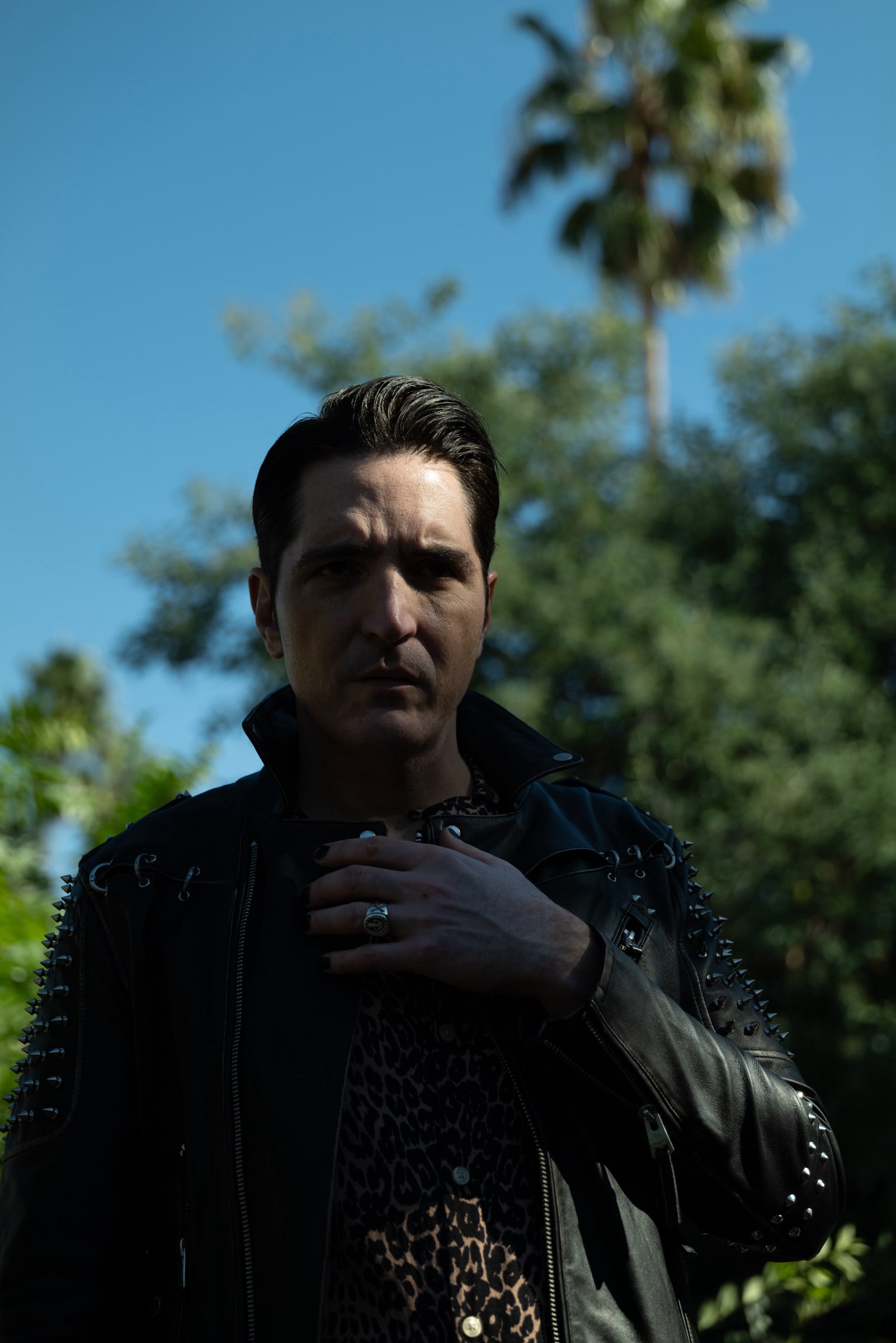
You know David Dastmalchian’s face, because it’s a hard one to forget. From the moment he appeared as the Joker’s henchman in Christopher Nolan’s The Dark Knight, the 48-year-old actor and writer has been a go-to for filmmakers looking to inject a dose of instant unease into their movies. A regular in the films of Denis Villeneuve—they’ve made three together—Dastmalchian has built a career out of playing outcasts, oddballs, and all-around strange dudes. But behind that dark veneer is an earnest artist who has clung to the art of storytelling to lift himself out of the throes of heroin addiction. In the new found-footage horror Late Night with the Devil, Dastmalchian takes center stage as a ‘70s talk show host whose Halloween special goes haywire when a guest gets all paranormal on him. The film stands as a showcase for a very successful actor who somehow feels like he’s getting his first shot to show what he can really do. To mark the occasion, Dastmalchian connected with his friend, Nine Inch Nails frontman Trent Reznor, to talk about their similar creative trajectories, and turning their personal demons into compelling art.
———
DAVID DASTMALCHIAN: Hey.
TRENT REZNOR: What’s going on, man?
DASTMALCHIAN: It’s been a ride since the last time I saw you. This is one of the most fun days of press I’ve probably done, ever.
REZNOR: Really? Well, let’s see if we can turn that around in the next hour.
DASTMALCHIAN: [Laughs]
REZNOR: You’re where right now?
DASTMALCHIAN: I’m in New York.
REZNOR: Cool. I was just going to say, having the pleasure of meeting you socially and then crossing that hurdle of actually reaching out and becoming friends, which for me is an awkward stage that I’m glad that we have done, it’s been great to get to know you on a personal level. And as I’ve gone back and looked at your work, I’ve been blown away by how much you’ve done and how wide-ranging it is. I myself am trying to break out of just doing music and getting more into storytelling. So I’m just interested in what excites you and what draws you to things? Where do you find the real reward?
DASTMALCHIAN: Get your hammock out, because I think about this often, but it’s not going to be an easy answer. Being a kid from a pretty conservative and yet very tumultuous home in the belt buckle of the Bible Belt, I’ve been both supremely terrified of and yet uncontrollably drawn to the shadowy corner of the room. I felt deeply connected to the late-night horror films that would be broadcast in Kansas City by my local horror hosts. I never imagined that I would be able to pursue a professional venture down that road, and just got lost over the years in the power and propulsion that comes from things like comic books, science fiction, horror, and cinema in general. And through a lot of wild and wacky circumstances, suddenly found myself training in Chicago at one of the best acting schools, and falling in love even further with the power of outsider and independent art. And sadly during that time, because of so much untreated stuff in my past, I developed a pretty deadly love affair with heroin. That went on for enough years that I ended up leaving storytelling behind, becoming homeless and determined to kill myself.
REZNOR: Right.
DASTMALCHIAN: Miraculously I failed and eventually got the will to live, but learning how to live without the benefit of all that stuff took me back to being a consumer of story, but I didn’t know if I would ever be able to be a producer of story again. And five years into my clean journey, I was so afraid of acting that the writing came out of a sense of necessity, because I felt a deep desire to tell a story. And then miraculously, theater friends in Chicago pulled me back up on stage, and contrary to my belief, acting without drugs ended up being wildly much better.
REZNOR: Super interesting.
DASTMALCHIAN: I get my first job in a movie, it’s a Christopher Nolan film, I’m now getting a bit of money in my pocket, my dream of working in cinema is happening. But I’m so far behind the eight-ball. I’ve lost so many critical years. Those twenties for an actor are so vital to building connections, showing the world that you can do this stuff. I lost all that. So I was so driven by this need to find my way through making my own stuff and putting myself out there. And then the work started to come together, and that led to people starting to pull me into their projects. And it just fed itself. All of a sudden there I was with these opportunities to write comic books which I could develop into bigger projects. And I become a father, and I get deep into this journey and I go, “What was it that I was doing this for?” Yeah, the approval, of course. The need to express myself, most definitely. But what is it about? So here in 2024, looking at how disconnected from safety, security, connection we are, sometimes I feel like the universe has this cruel desire to keep trying to convince people that we’re all alone. So, to sound so fucking cheesy and pretentious, I’m driven to want to tell stories that really land with people, because I think when you stick the landing, you feel less alone for even just a fraction of a second. So that’s where I’m at today.
REZNOR: Hearing you tell that story, it’s remarkably similar to my own. The first time we were together, one-on-one, you immediately brought up sobriety. We’ve been sober about the same amount of time, and much like you, I had the same frustrations about time lost and wishing I could have condensed that period, which for me was about five years lost, into six months. But we play the hand we’re dealt. I had the same insecurity about, did I need to be high to do what I do? Can I write music from a sober point of view? I had convinced myself of the romantic notion that that was part of the fuel, and I bought into the same mythologized bullshit that we all did—that it was necessary. And then also like you, and much to my utter joy and amazement, I found that the act of creating was more fun and the work I was doing was better, and I could remember a lot more of it.
DASTMALCHIAN: [Laughs]
REZNOR: I’m incredibly grateful that regardless of what pain and trauma and whatever the fuck led me into the hole I got myself into, I’m glad I went through it and am able to be the person I am today, and feel just fucking grateful to be alive and to feel in touch with things. But what I was going to ask you, just to tick the box of Late Night with the Devil, the two things that really pushed it over the top for me was the production design, and more so your performance, and really getting a full helping of what you’re capable of doing in a nuanced and subtle way, that creates this guy who is vulnerable and has a humanity, but you also see the corruption at work in the misplaced perhaps priorities.
DASTMALCHIAN: Yeah.
REZNOR: Here’s the question. My worldview is as a musician that keeps to himself and hasn’t interacted with tons of other artists. As I’ve gotten into film scoring, and I’m now immersed in various triages of going into an intense working relationship of complete collaboration, I’m curious, what is it that rings the bell that says, “I’m ready to devote god knows how much mental effort and time to realizing a character like that?”
DASTMALCHIAN: First, it was the hook that got my attention. One of the producers, a guy named Roy Lee, sends me an email that says, “I’m making this small movie. These guys are convinced you’re the man for the role. I agree. Take a look.” Because I trust Roy’s taste, I open it pretty quickly. It’s like a microfiche of an old TV Guide, and they’ve photoshopped my face into imagery of what looks like sensational stories about this talk show and things that had gone wrong on Halloween night in 1977. To me, tone is everything, and it emanated that whoever made it knew what the fuck they were doing. They understood the detail and nuance of every little thing about this. So I started reading the script, and the material grabbed me. The second thing that got me was the directors themselves, Colin and Cameron. I read their letter, because I sometimes don’t even like reading the letters I get from potential directors because I feel so bad that they’re going to say something nice to me and I’m going to have to reject them.
REZNOR: I hear you loud and fucking clear on that.
DASTMALCHIAN: And they say to me, “We think you’re an amazing actor, but the reason we know you’re right for Jack Delroy is we read the article you wrote in Fangoria.” Which I did. I wrote this article after my mom passed away about my fascination with horror hosts and the importance of these figures that helped carry us into the dark places, and then help us come back safely.
REZNOR: Who was your guy?
DASTMALCHIAN: Her name was Crematia Mortem. She hosted Friday Night Nightmare Theater. She was my first horror host, my first crush, my first inspiration. I’d be this repressed religious boy, sneaking downstairs under the blanket, watching her crack jokes and look so hot to me, with that pale skin, coming out of her coffin. Did you have one?
REZNOR: Mine was “Chilly” Billy Cardille.
DASTMALCHIAN: Chilly Billy!
REZNOR: Didn’t tick all the same boxes that you just mentioned, but the vibe of that brings back such warm rose-colored glasses.
DASTMALCHIAN: Dude, I had something to give you the other night when you guys were over, and I’ll get it to you in physical form. My comic series is all about horror hosts and that world, so if you have an affinity for it, I want you to check those out.
REZNOR: That’d be great.
DASTMALCHIAN: But ultimately the reason why I did it was it scared the shit out of me. The idea of me embodying the kind of person who could captivate a television audience every night with charm and humor and wit scared me. And yet these guys seemed so convinced I was the guy. But if I fuck this up, if I don’t nail the essence of what feels authentically like a real late night talk show, the movie’s done. I was terrified.
REZNOR: Terrified of your ability to pull it off.
DASTMALCHIAN: Yeah.
REZNOR: And then what goes into getting over that fear?
DASTMALCHIAN: I had a couple months of prep, thank god. So every night, I’d watch old episodes of a guy named Don Lane, old episodes of Carson, Dick Cavett, Dave Letterman. And then I’d watch old footage of Morton Downey Jr. and Phil Donahue, you name it. I just wanted to feel this energy and allow it to penetrate my subconscious.
REZNOR: Did you know you had it when you were there filming it? Did you feel, “I’m pulling this off?”
DASTMALCHIAN: No. I’m a weird looking guy. I don’t see myself being the guy that a network is going to be like, “He’s our host.” But when I saw myself in the complete look, I was like, “Oh, that works.” But the big moment was the opening monologue. I was backstage shaking so hard. I was so afraid that I’m going to do this monologue and all these people are here and they’re going to go, “Well, this is the movie we’re going to make.” I’ve got a live band playing me in, a great co host who’s introducing me, a full audience full of extras dressed up like it’s Halloween. And it started to go and they started to laugh and it didn’t feel canned. It felt like they were with me, and I started to build confidence.
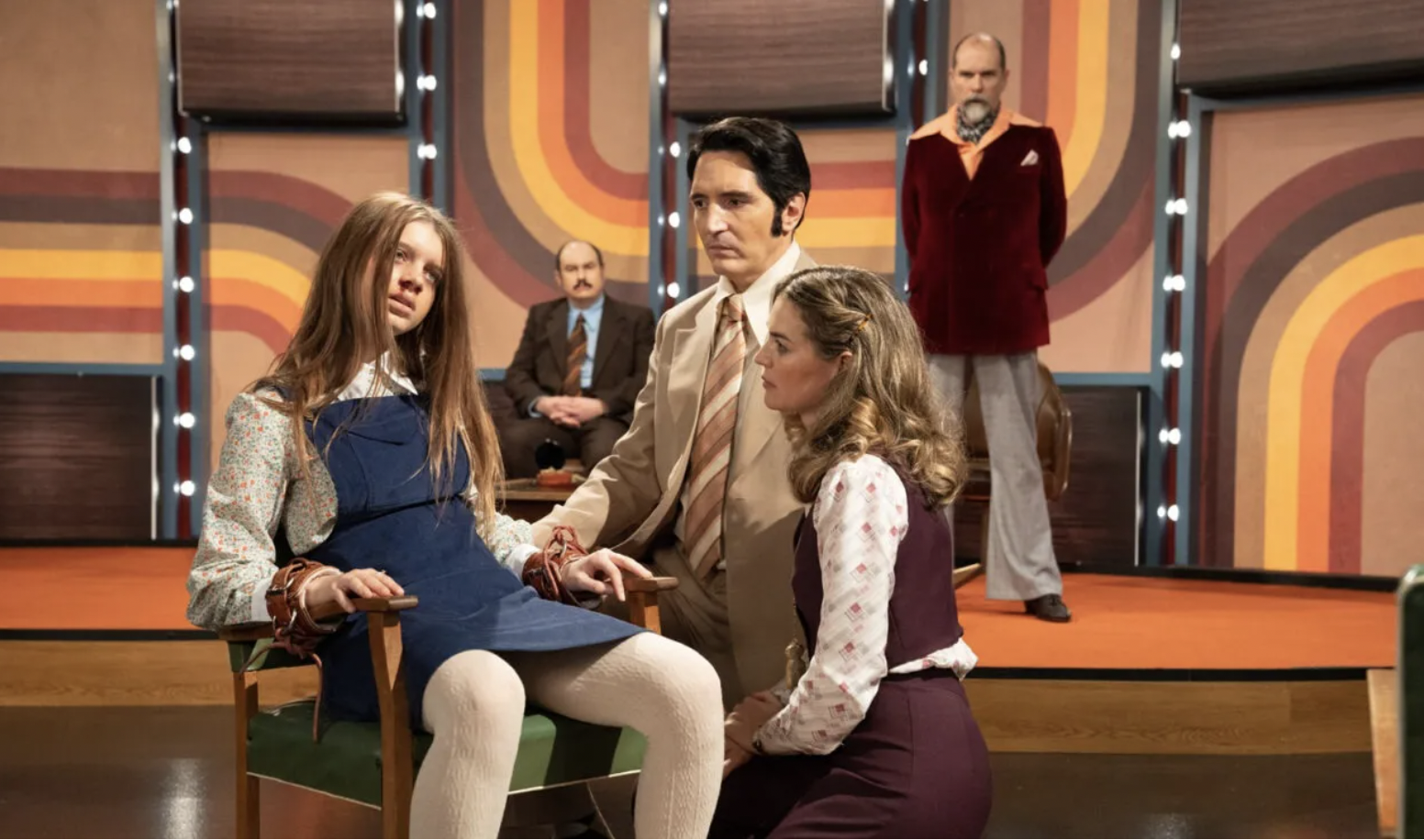
REZNOR: I’ve always wondered, as an actor, let’s say when you’re in a movie like this, you’re carrying it, the shoot’s over, you head home—is it pins and needles wondering what the cut’s going to show up like? There’s so much that gets done after the camera stops rolling, so I’ve always wondered that, as a control freak myself.
DASTMALCHIAN: [Laughs]
REZNOR: Not to answer my own question, but I’ve learned this a little bit in scoring, where I’m not the captain of the ship. I find it surprisingly enjoyable to not be the boss in something where you’re working in service to someone else’s vision, and you’re helping to color outside the lines and make it better than they hope it is. But I approach these things like I am wanting to understand your story, and bring my skill set to help bring it to life. But there’s times when I’m at the mix stage, and I wouldn’t have done this and I wouldn’t have done that. So I guess what I’m saying is, I can feel your commitment from watching the film. I’m not surprised to hear about the preparation and how serious it’s taken because it’s clear from the first minute you open your mouth. But is there a period of letting go and hoping it comes back in the way you hope?
DASTMALCHIAN: It’s a great question and it actually leads me to a question that I want to ask you, since you’ve been asking me all the fucking questions, Trent. But listen. The first movie I ever did, I learned a very hard lesson. I was The Dark Knight. I shot very, very quick scenes that were life-changing for me, but the movie did not come out until one year later. During that year, I was sleepless, terrified, always thinking about how I did. I lived under a cloud of fear and darkness. I went to see the movie the night it came out and it was one of the greatest things I’d ever seen in my life, but as soon as my scenes came up, I thought I was really bad, and then the movie was over.
REZNOR: You thought, why’d they pick that take?
DASTMALCHIAN: Why did they pick me? To me, it was the only part of the movie that didn’t look like a real movie. It almost looked like home video. But process is everything to me, because I have no control when I walk away. If I love the process, which I really did on Late Night with the Devil, I genuinely let go. And then when it’s time to see the thing, I have no assumptions. I can think fondly of the experience making it. I’ve had experiences that were quite negative and then the product turned out fine, but I don’t really care for it.
REZNOR: That’s interesting. I had read long ago, at least I think I did, De Niro being asked, essentially, why are you in shitty movies? And his response was similar to yours. “It’s the process. I haven’t even seen some of the films, but I’m doing it because it was exciting to me, regardless of the context or the film that’s contained within. And I thought, “Really?” It felt like a stretch from my own perspective of being so attached to the work I do. But then again, scoring has opened my eyes to a lot of that same thing of, I’m part of the whole, I’m not the whole whole, and there’s a futility involved in trying to control things you can’t control.
DASTMALCHIAN: Yes.
REZNOR: So let’s talk for a second about Animals [the 2014 film Dastmalchian wrote and starred in] , which I was unfamiliar with until I watched it yesterday in the midst of thinking that I was going to then be productive the rest of the day, which I was not.
DASTMALCHIAN: Yay!
REZNOR: I got punched in the gut, so bravo on that. I was sitting in my office with tears in my eyes in the middle of the afternoon.
DASTMALCHIAN: Oh, man. Thank you. They say write what you know, right? They say that to you and it’s a fucking idiom. But holy shit. Addiction is something that any human walking this earth can relate to, whether they’ve ever been near a needle or even had a struggle with drinking. So that was my way in. This was written when I was working nights at a movie theater and doing telemarketing during the day. It originally came out of me as this sad attempt to be more of a Badlands-meets-True Romance heist-y bullshit thing. But when I started peeling away all the stuff that had no validity, I understood that it was going to be a film about codependency because I was coming out of the most codependent, most destructive relationship I’d ever been in. I realized early on, this is not a commercial film, and with art films, you have the incredible luxury of being able to ask a really difficult question and not answer it. And that’s what I wanted to do with Animals. So thank you for watching it. That’s just me babbling, but I don’t get to talk about that movie much, and I’m so proud of it.
REZNOR: As you should be. I was ashamed that I was unaware of it before. I think the portrayal of addiction is authentic as the form of madness that it is. That’s also what was really resonating with me.
DASTMALCHIAN: Yeah. It’s Dante’s Inferno, man. But if you’ve been on the inside, you know that no amount of logic or reason is going to shake you free of that. So that was a wildly empowering experience, to utilize my own history, my own journey. I was convinced I wasn’t going to tell anybody in the press that I had a real history with this stuff because I was afraid then I’m not going to work in Hollywood. People are going to find out I used to actually be this guy. Then, I ended up making the choice to share openly, and from then on every story I’ve written has to come from a place that is personal to me, or it isn’t worth shit. I know that the personal nature of your work is obviously a reflection of all the thoughts and feelings that are inside, that you’re trying to find a way to express. How much of what’s going on within you personally is even appropriate to bring into the work, or is it strictly a matter of achieving the vision of what the director needs? I’m so curious.
REZNOR: For me, I knew I was a musician and I knew I wanted to have this kind of career, and it felt like the only thing I cared about. But the question I was putting off was, what if I’m not a great writer? So I played in other people’s bands and wasted time. But when I finally sat down and said, I’m going to see what I actually have to say, the first experiments were terrible, because it was me pretending I was somebody else. It was me using a safety net of, I like The Clash, so I’m going to sound like The Clash.
DASTMALCHIAN: Right.
REZNOR: Before long, I realized that the journal I’d been keeping were song lyrics, but that wasn’t anything I could ever show anybody because that wasn’t a character. That was me at my most painful, in terms of not fitting in, not being able to function in the world, feeling like wherever I am is not where I should be. So Nine Inch Nails was born of having the courage to commit some of those journal entries to tape and hand them to a friend and then have to run out of the room. But I did realize there was an authenticity and an honesty there that it was powerful and resonated. That became the blueprint of what ended up being Nine Inch Nails. Let me try to be as honest with myself as I can, embrace whatever warts and tangents I’m on at that time. With that comes the fear of not hiding behind a construct, and much like you had said earlier, wondering if I pulled this off, coming home from something and wondering if I’m interesting enough. Jump ahead to, [David] Fincher asking me to score The Social Network. It was something I was interested in, but didn’t know how to do. I didn’t know the process, the technique, I don’t even know the terms you use. I could write a song, but I don’t know how to write a 13-second piece of music for someone walking out of a room and going up the steps. Is that a chorus or is that a verse? I turned them down at first because I didn’t feel like I had enough energy in the tank to take on a new medium. I was tired from touring and I was just getting married and I promised myself I was going to carve some time out for me, and then this came up and it felt overwhelming. So I said no. But then I felt shittier for the next few weeks because I felt like I’d let him down and I’ve let myself down. And maybe I was just being a pussy. I called him back and said, “It’s not the material, it’s not you. I just didn’t want to ruin your movie.”
DASTMALCHIAN: I get it.
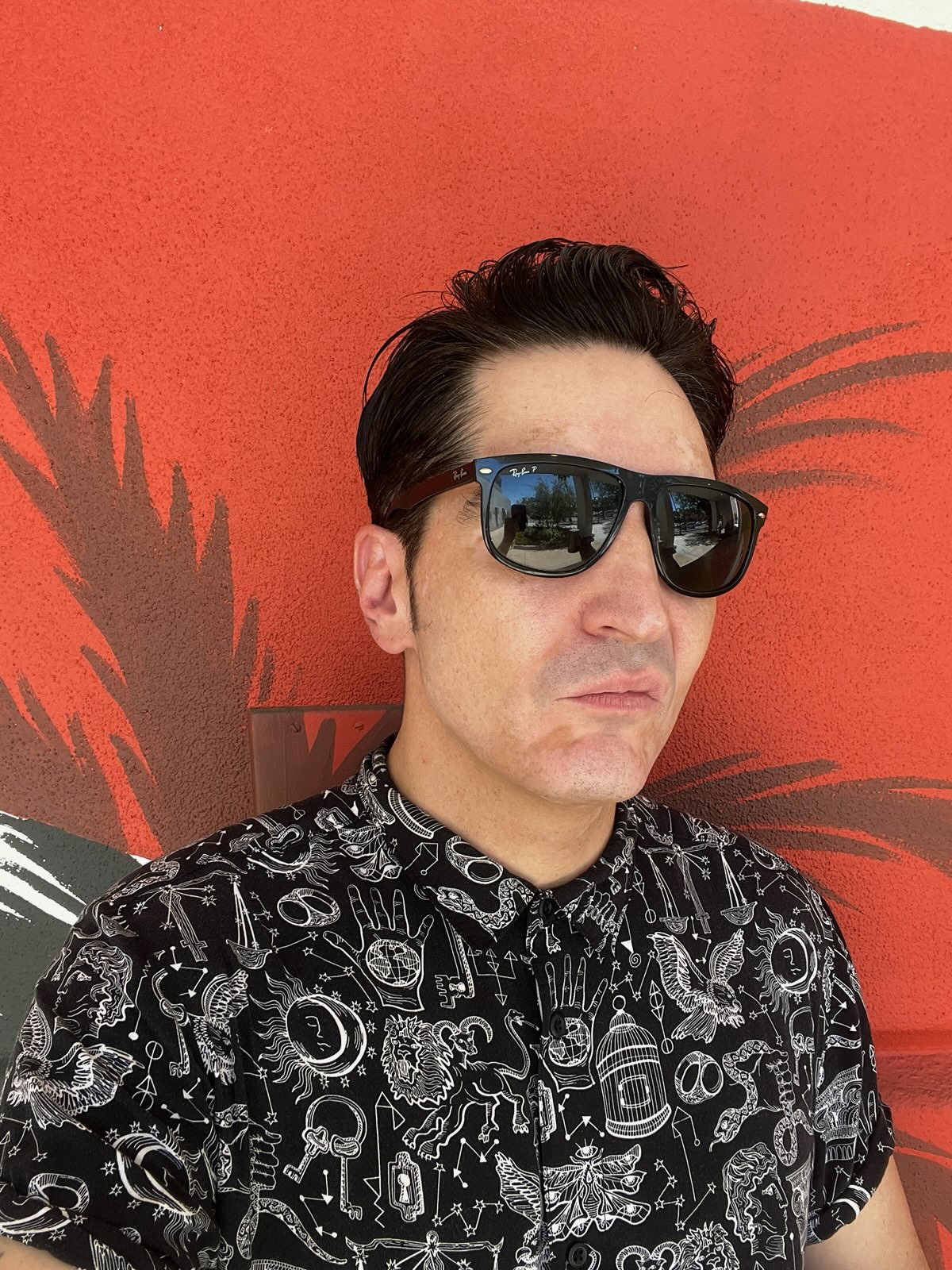
REZNOR: He’s like, “Hey, I’m still waiting on you to do it. Come on.” I got in the car. I was working with Atticus [Ross] on a lot of stuff and said, “Do you want to take this on with me?” Anyway, we had enough time and a very nurturing situation with David who’s an incredible collaborator. He fights hard to make sure the inner circle of collaborators are protected from any outside influence, like studios or money people. And I can’t say enough about what a nurturing, positive environment that was to try things. And during that time to get to the point, the revelation came in. It’s not about the technique and it’s not about knowing how to conduct an orchestra or the voicings of a fucking cello or any of that bullshit. To me, it comes down to, can I adapt the thing that I think I can do, which is, I feel things too deeply, I feel too affected by things—being a parent has amplified that exponentially—and I can translate some of that feeling into music that can frame the feeling, and perhaps enhance it or set the tone. I don’t know how to score that scene of 13 seconds of walking out of a room, but I can relate to Fincher’s character of Zuckerberg as someone who believes so strongly in an idea that maybe it’s worth fucking my friends over for, and then feeling like, was that worth it because I still feel hollow? It didn’t fix the fucking hole inside me. I know what that feels like. I can make music that can support that feeling. That realization was a pretty significant thing that helped me understand what it is I think I am good at and informed me that I can now adapt that into the medium of film. And it became a rewarding, fun experience and very educational. I’m not sure what the original thing you asked was.
DASTMALCHIAN: I just want to say one thing, because, you could have had a very successful career in the sense being a Clash-adjacent attempt at a professional version of a cover band, but I don’t think any other path would’ve led to some of the moments that I’ve gotten to experience, of that feeling of not being so alone in this universe, Trent. You’ve given me that a million fold. I’ve seen you performing live and turned to my wife who is just sobbing because you were willing to do that thing.
REZNOR: I appreciate you saying that. As we head to the end of this, the thing that I’ve asked myself is, I can’t kid myself that I’m young anymore. You know what I mean? You’ll find out.
DASTMALCHIAN: My Fiber Well gummies remind me every morning that I am far from it, my friend.
REZNOR: I’ve started to think more about how things are finite. What matters? My kids matter, my wife matters. But in terms of my work, really just thinking about that. What’s the hill that I want to climb and what am I getting from it? The answer that I’ve come to is the feeling of finishing a song in the studio and feeling like this is the best work I can do. You might like it, you might not. It might be successful, or no one will pay any attention to it. But I know I tapped into something. That’s the payoff. It’s not the chart position or the snarky comments or the praise or the feedback. I’m not saying those things don’t play roles, but it’s not the point. For me, if I tap into that thing, and the creation process, I have a value that I didn’t. It might be the broken voice in me that still speaks up, but I feel validated. For you is it acting? Is it writing? Is it with Good Fiend Films, your production company?
DASTMALCHIAN: Any form of storytelling. I love sitting at my desk and just doing the work. It hurts. It’s painful. It sucks sometimes. But I love that I’m on a journey. I don’t know if I’ll ever get there, but I’m on a journey where the approval, the praise and the validation of others is just going to be icing on this cake.
REZNOR: Yeah. Well said.
DASTMALCHIAN: I knew this was going to be an awesome conversation. I can’t tell you how fucking it exceeded my dreams. And again, as much fun as it is to hang out and play games and watch movies together, getting to do this is something that’s hard for the real world to ever carve out time for, so I’m grateful that the opportunity came up. I feel like we’re just beginning.
REZNOR: I appreciate you reaching out for me to do this. I’ve really enjoyed it. Stay sane.
DASTMALCHIAN: Thanks, man. You too.


